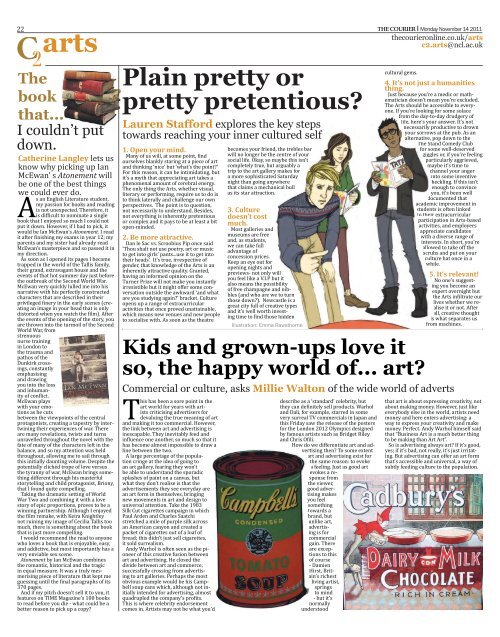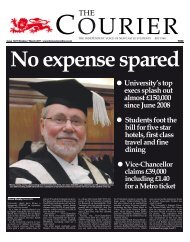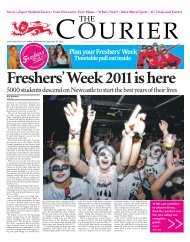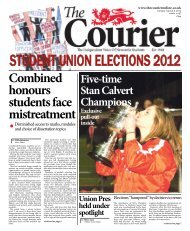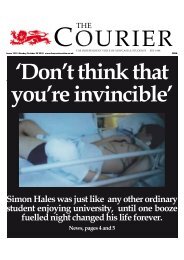You also want an ePaper? Increase the reach of your titles
YUMPU automatically turns print PDFs into web optimized ePapers that Google loves.
22 THE COURIER Monday <strong>November</strong> 14 2011thecourieronline.co.uk/artsc2.arts@ncl.ac.ukarts<strong>The</strong>bookthat...I couldn’t putdown.Catherine Langley lets usknow why picking up IanMcEwan’ s Atonement willbe one of the best thingswe could ever do.As an English Literature student,my passion for books and readingis not unexpected. <strong>The</strong>refore, itis dificult to nominate a singlebook that I enjoyed so much I could notput it down. However, if I had to pick, itwould be Ian McEwan’s Atonement. I readit after inishing my exams in year 12; myparents and my sister had already readMcEwan’s masterpiece and so passed it inmy direction.As soon as I opened its pages I becametrapped in the world of the Tallis family,their grand, extravagant house and theevents of that hot summer day just beforethe outbreak of the Second World War.McEwan very quickly lulled me into hisnarrative with his perfectly constructedcharacters that are described in theirprivileged inery in the early scenes (creatingan image in your head that is onlydistorted when you watch the ilm). Afterthe events of the opening of the story, youare thrown into the turmoil of the SecondWorld War, fromstrenuousnurse trainingin London tothe trauma andpathos of theDunkirk crossings,constantlyemphasisingand drawingyou into the lossand inhumanityof conlict.McEwan playswith your emotionsas he cutsbetween the viewpoints of the centralprotagonists, creating a tapestry by intertwiningtheir experiences of war. <strong>The</strong>reare many revelations, twists and turnsunravelled throughout the novel with thefate of many of the characters left in thebalance, and so my attention was heldthroughout, allowing me to sail throughthis initially daunting volume. Despite thepotentially clichéd trope of love versusthe tyranny of war, McEwan brings somethingdifferent through his masterfulstorytelling and child protagonist, Briony,that I found quite compelling.Taking the dramatic setting of WorldWar Two and combining it with a lovestory of epic proportions, proves to be awinning partnership. Although I enjoyedthe ilm remake, with Keira Knightleynot ruining my image of Cecilia Tallis toomuch, there is something about the bookthat is just more compelling.I would recommend the read to anyonewho loves a book that is enjoyable, easy,and addictive, but most importantly has avery enviable sex scene.Atonement by Ian McEwan combinesthe romantic, historical and the tragicin equal measure. It was a truly mesmerisingpiece of literature that kept meguessing until the inal paragraphs of its370 pages.And if my pitch doesn’t sell it to you, itfeatures on TIME Magazine’s 100 booksto read before you die - what could be abetter reason to pick up a copy?Plain pretty orpretty pretentious?Lauren Stafford explores the key stepstowards reaching your inner cultured self1. Open your mind.Many of us will, at some point, indourselves blankly staring at a piece of artand thinking ‘nice’ but ‘what’s the point?’For this reason, it can be intimidating, butit’s a myth that appreciating art takes aphenomenal amount of cerebral energy.<strong>The</strong> only thing the Arts, whether visual,literary or performing, require us to do isto think laterally and challenge our ownperspectives. <strong>The</strong> point is to question,not necessarily to understand. Besides,not everything is inherently pretentiousor complex and it pays to be at least a bitopen-minded.2. Be more attractive.Dan le Sac vs. Scroobius Pip once said‘Thou shalt not use poetry, art or musicto get into girls’ pants...use it to get intotheir heads’. It’s true, irrespective ofgender, that knowledge of the Arts is aninherently attractive quality. Granted,having an informed opinion on theTurner Prize will not make you instantlyirresistible but it might offer some conversationoutside the awkward ‘and whatare you studying again?’ bracket. Cultureopens up a range of extracurricularactivities that once proved unattainable,which means new venues and new peopleto socialise with. As soon as the theatreThis has been a sore point in theart world for years with artistscriticising advertisers fordevaluing the true meaning of artand making it too commercial. However,the link between art and advertising isinescapable. <strong>The</strong>y inevitably feed andinluence one another, so much so that ithas become almost impossible to draw aline between the two.A large percentage of the populationcringe at the idea of going toan art gallery, fearing they won’tbe able to understand the sporadicsplashes of paint on a canvas, butwhat they don’t realise is that theadvertisements they see everyday arean art form in themselves, bringingnew movements in art and design touniversal attention. Take the 1983Silk Cut cigarettes campaign in whichPaul Arden and Charles Saatchistretched a mile of purple silk acrossan American canyon and created apacket of cigarettes out of a loaf ofbread; this didn’t just sell cigarettes,it sold surrealism.Andy Warhol is often seen as the pioneerof this creative fusion betweenart and advertising. He closed thedivide between art and commerce,successfully crossing from advertisingto art galleries. Perhaps the mostobvious example would be his Camp-bell soup cans which, although not initiallyintended for advertising, almostquadrupled the company’s proits.This is where celebrity endorsementcomes in. Artists may not be what you’dbecomes your friend, the trebles barwill no longer be the centre of yoursocial life. Okay, so maybe this isn’tcompletely true, but arguably atrip to the art gallery makes fora more sophisticated Saturdaynight than going anywherethat claims a mechanical bullas its star attraction.3. Culturedoesn’t costmuch.Most galleries andmuseums are freeand, as students,we can take fulladvantage ofconcession prices.Keep an eye out foropening nights andpreviews- not only willyou feel like a V.I.P but italso means the possibilityof free champagne and nibbles(and who are we to turnthose down?). Newcastle is agreat city full of creative typesand it’s well worth investingtime to ind ind those hiddenIllustration: Emma Rawsthornecultural gems.Kids and grown-ups love itso, the happy world of... art?4. It’s not just a humanitiesthing.Just because you’re a medic or mathematiciandoesn’t mean you’re excluded.<strong>The</strong> Arts should be accessible to every-one. If you’re looking for some solacefrom the day-to-day drudgery oflife, here’s your answer. It’s notnecessarily productive to drownyour sorrows at the pub. As analternative, pop down to the<strong>The</strong> Stand Comedy Clubfor some well-deservedgiggles or, if you’re feelingparticularly aggrieved,maybe it’s time tochannel your angerinto some inventiveheckling. If this isn’tenough to convinceyou, it’s been welldocumented thatacademic improvement instudents is often linkedto their extracurricularparticipation in Arts-basedactivities, and employersappreciate candidateswith a diverse range ofinterests. In short, you’reallowed to take off thescrubs and put on yourculture hat once in awhile.5. It’s relevant!No one’s suggest-ing you become anexpert overnight butthe Arts iniltrate iniltrate ourlives whether we realiseit or not. Afterall, creative thoughtis what separates usfrom machines.Commercial or culture, asks Millie Walton of the wide world of advertsdescribe as a ‘standard’ celebrity, butthey can deinitely sell products. Warholand Dali, for example, starred in somevery surreal TV commercials in Japan andthis Friday saw the release of the postersfor the London 2012 Olympics designedby famous artists such as Bridget Rileyand Chris Oili.How do we differentiate art and ad-vertising then? To some extentart and advertising exist forthe same reason: to evokea feeling. Just as good artevokes a responsefromthe viewer,good advertisingmakesyou feelsomethingtowards abrand, butunlike art,advertisingis forcommercialgain. <strong>The</strong>reare exceptionsto thisof course- DamienHirst, Britain’srichestliving artist,springsto mind- but it’snormallyunderstoodthat art is about expressing creativity, notabout making money. However, just likeeverybody else in the world, artists needmoney and here enters advertising: away to express your creativity and makemoney. Perfect. Andy Warhol himself saidthat “Business Art is a much better thingto be making than Art Art”.So is advertising always art? If it’s good,yes; if it’s bad, not really, it’s just irritating.But advertising can offer an art formthat’s accessible and universal, a way ofsubtly feeding culture to the population.


